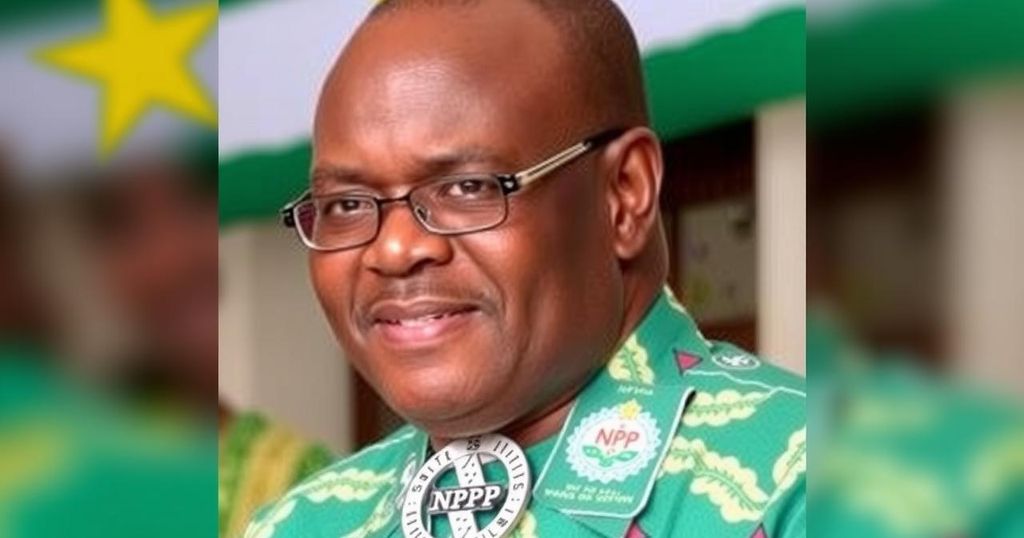Ghana 2024 Elections: Why Nana Akufo-Addo and NPP Lost to John Mahama

In Ghana’s 2024 elections, the ruling NPP, led by Nana Akufo-Addo and Dr. Bawumia, lost to John Mahama of the NDC. This defeat was influenced by widespread economic crises, high inflation, and voter dissatisfaction with the government’s performance. The NPP’s campaign slogan “break the eight” failed to resonate, leading to significant losses in both elections and parliamentary seats, mirroring trends seen in other African nations.
The recent election in Ghana resulted in the defeat of the ruling New Patriotic Party (NPP), led by President Nana Akufo-Addo and Vice President Dr. Mahamudu Bawumia, by John Mahama of the National Democratic Congress (NDC). This marks a significant shift, as the NPP sought to extend its term beyond eight years, a feat no ruling party has accomplished since the Fourth Republic began in 1992. The NPP’s slogan “break the eight” failed to resonate with voters amid a backdrop of severe economic challenges, prompting a shift toward the opposition.
The NPP’s tenure has been marred by a crippling economic crisis, characterized by record-high inflation, escalating costs of living, and rising unemployment rates. Despite the government’s insistence that it managed the country well in the face of challenges such as the COVID-19 pandemic and the Russia-Ukraine conflict, public dissatisfaction grew, leading to widespread criticism of the government’s economic management. Surveys prior to the elections indicated a lack of confidence in the NPP, predicting significant losses in seats.
A financial expert noted, “the state of the economy caused the NPP government to lose this election.” As food prices soared and unemployment rates hit alarming levels, voters expressed their desire for change. The government’s attempts to promote initiatives such as free senior high school education and digitalization strategies did little to alleviate public frustration, as the immediate concerns remained centered around basic needs.
The Electoral Commission’s results confirmed John Mahama’s victory in several key regions, including Central and Greater Accra, where the NDC significantly increased its vote share compared to the previous 2020 elections. Numerous incumbent NPP ministers lost their parliamentary seats, reflecting a broader trend of voter discontent and a rejection of the ruling party’s previous policies.
Furthermore, Ghana has joined several African nations witnessing similar patterns of electoral change this year. As more countries, including Botswana and Mauritius, have seen ruling parties abruptly end their terms, it raises questions about governance, economic crises, and the effectiveness of opposition alliances. Ultimately, the 2024 elections mark a pivotal moment in Ghana’s political history, as citizens opted to withdraw their support from a government perceived to have failed in addressing their needs and aspirations.
The backdrop of this election cycle in Ghana underscores a historical pattern where no party has maintained power beyond eight years since the Fourth Republic’s establishment in 1992. The NPP sought to break this norm, facing significant challenges due to a deteriorating economic environment marked by rampant inflation, increased living costs, and widespread unemployment. As citizens grappled with these adversities, public approval for the government’s management waned, resulting in a landscape ripe for opposition success.
The defeat of the New Patriotic Party in the 2024 elections signifies a profound shift in Ghanaian politics, driven largely by economic discontent and effective opposition organization. The electoral loss serves as a clear message from the electorate about the importance of socioeconomic stability and accountability in governance. As Ghana navigates this transition, the outcomes may impact broader political trends seen across the continent, where disillusionment with ruling parties is becoming increasingly prevalent.
Original Source: www.bbc.com






